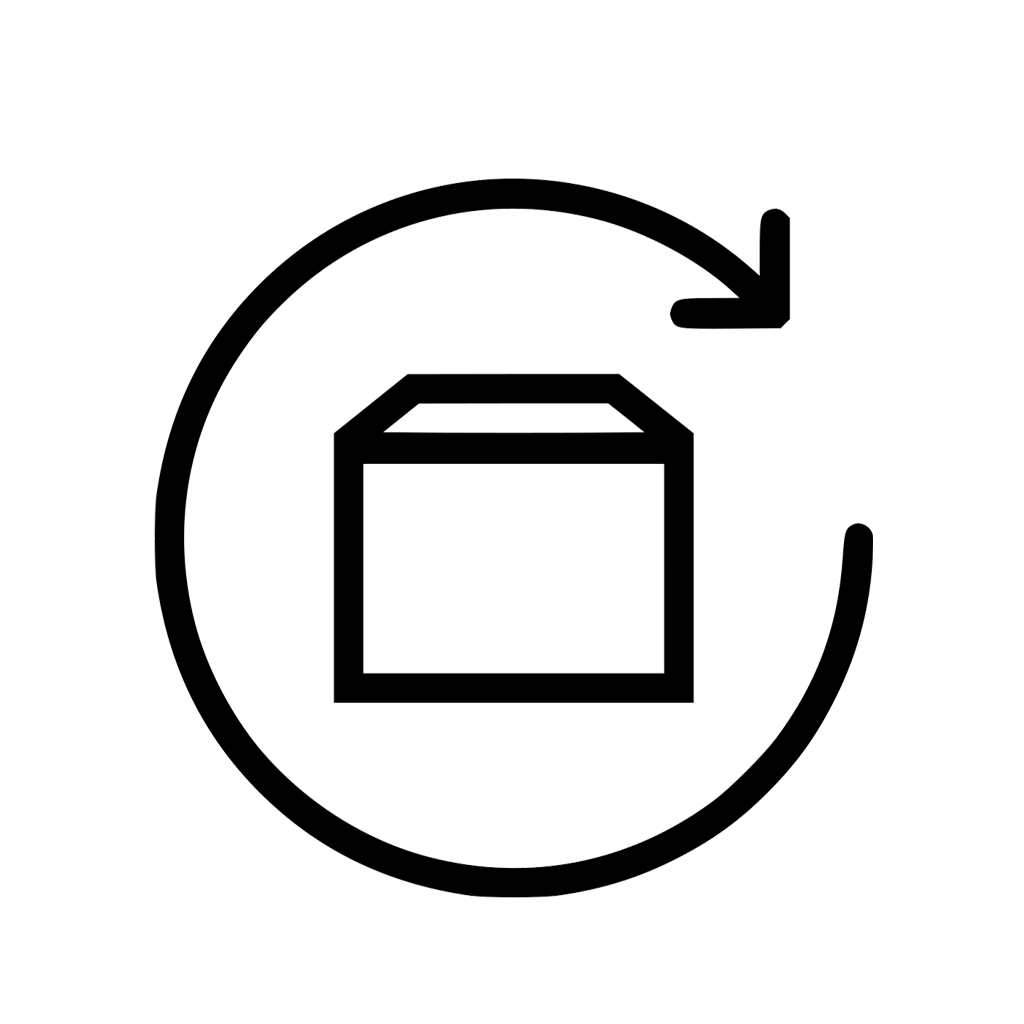
Where Two Worlds Collide: How the Ocean Saved Lydia Paleschi
From experiencing intense anxiety which stopped her from leaving the house for months, to working as crew and sailing 7,000 miles on sailing boats; cold water swimming has been a life-changing tool for freelance writer Lydia Paleschi to manage her mental health. So much so, that in 2020 Lydia co-wrote A Guide to Wild Swimming in Cornwall with two friends to promote the wellbeing benefits of cold water immersion. We talk to Lydia about how swimming changed her life, how her relationship with the ocean has changed over time to encompass so much more than swimming, how she deals with fear today and why she encourages others to get in the water.
The beginning. Humans have explored less than 5% of the world’s oceans, it’s one of Mother Nature’s strange yet fascinating creations; an inexplicable enigma. Similar to the likes of flames crackling and snapping during a bonfire - we can’t stop staring or put our finger on what we feel, but we know it makes us feel. We all have an affinity with the ocean. Some of us go to bathe, to weep, to admire, to surf, to explore, to let off steam… But whether we fear it or embrace it, there’s always an element of profound respect when it comes to the deep blue. Yet, for Lydia Paleschi, it would turn out to mean so much more. Lydia was born and raised in Falmouth, a famous maritime town on Cornwall’s south coast, but while she admired the ocean’s beauty from afar, she had little inclination of getting in when she was young. “We’re from Falmouth, so literally right next to the sea. My family don’t really swim, I’ve never known my parents or grandparents to get into the sea. When I think about that now, it’s really weird," says Lydia. While this may seem like an anomaly, it’s more common than people think, with over 14 million adults (that’s one in three) in the UK that don’t - or can’t - swim the length of a 25m pool.

Like many people from rural areas, Lydia left her slow living seaside lifestyle in her early twenties for the hustle and bustle of the city. After completing a Political Science degree in Cardiff, she moved to London to work in the House of Commons. She soon realised that everything she had been working towards and what she thought she wanted from life was an illusion. Over time, this disconnect became overbearing. London’s way of life became unbearable, conjuring up feelings of overstimulation and disconnection, leaving Lydia with extreme levels of anxiety. It was the beginning of a period of huge disconnection and confusion in her life, which would manifest into agoraphobia. “I ended up having a breakdown at 24. I was highly anxious and disconnected, with unresolved trauma in my life and it got to a tipping point. I felt like I couldn’t do anything.” In Lydia’s darkest moments, she couldn’t move her body, or use physical movement to reduce her anxiety: “I couldn’t exercise because adrenaline would give me a panic attack, I was so scared of having a panic attack that it absolutely took over my life. I couldn’t leave the house or anything.” She did what was best for her wellbeing by packing her bags and leaving London behind, coming home to the comfort of the Cornwall.
Unsure where to go or what to do next, Lydia’s mum suggested going for a swim at their local pool in Falmouth. This was the first time Lydia had been able to leave the house in months. Little did they know this would be the drop that caused an infinite ripple, leading to a series of significant events. “My mum took me pool swimming because the water supports the weight of your body, so it was a way for me to lightly exercise but feel more physically supported, both by the water and by having my mum there.” Unbeknownst to Lydia, this one pool swim would later develop into regular cold water sea swims with friends. These swims began building up to something deeper, a blue therapy that would steer her career - and life - in a whole new direction. “It evolved from there into sea swimming. The release from my thoughts that came with the cold water and the bravery aspect of pushing myself to do something uncomfortable helped me to build mental resilience. When you’re really anxious you need to expose yourself to your fears, whether that’s leaving the house, or supermarkets, or heights or whatever. But, it's a gradual process. You build up reps in that activity until one day it's ‘oh shit, I can do it’. You build up confidence in yourself over time, you get braver, and this is what cold water swimming was for me. I could use that as a reference point. I had a very personal relationship with this activity – it’s personal for many people – and for me it was life changing. It was like therapy. Then I went and had psychotherapy to resolve things from my past which I hadn’t dealt with afterwards, because I felt braver and it gave me the confidence to face it head on. It really helped me at my version of rock bottom.” When asked about her rock bottom, Lydia paused to take a moment, you could see she was taking herself back to that injurious time. “It was awful, I didn’t leave the house for four or five months. My mind was so unwell that I thought everything was going to kill me - I look back now and just feel sorry for that version of myself. I had no quality of life, there was none. At the time I thought, ‘fuck, is this my life now? Is this going to be forever?' ”
It wasn’t going to be forever. Four years later and still regularly swimming, Lydia had not forgotten the importance of that first float with her mum and how powerful a first step (or swim) can be in achieving new things. Because of this, she teamed up with some friends in 2020 to set up Wild Swimming Cornwall to promote the mental and physical health benefits of cold water swimming. Then, in 2021, she co-authored the Cornish swimming bible aka A Guide to Wild Swimming in Cornwall. They donated a copy of the book to every GP surgery, library and secondary school in Cornwall, plus made it available to purchase online. “The project centres around the aim of making cold water swimming and its many benefits accessible to as many people as possible. Our goal is to encourage wellness, a sense of community and an affinity with the natural world through cold water immersion,” says Lydia.
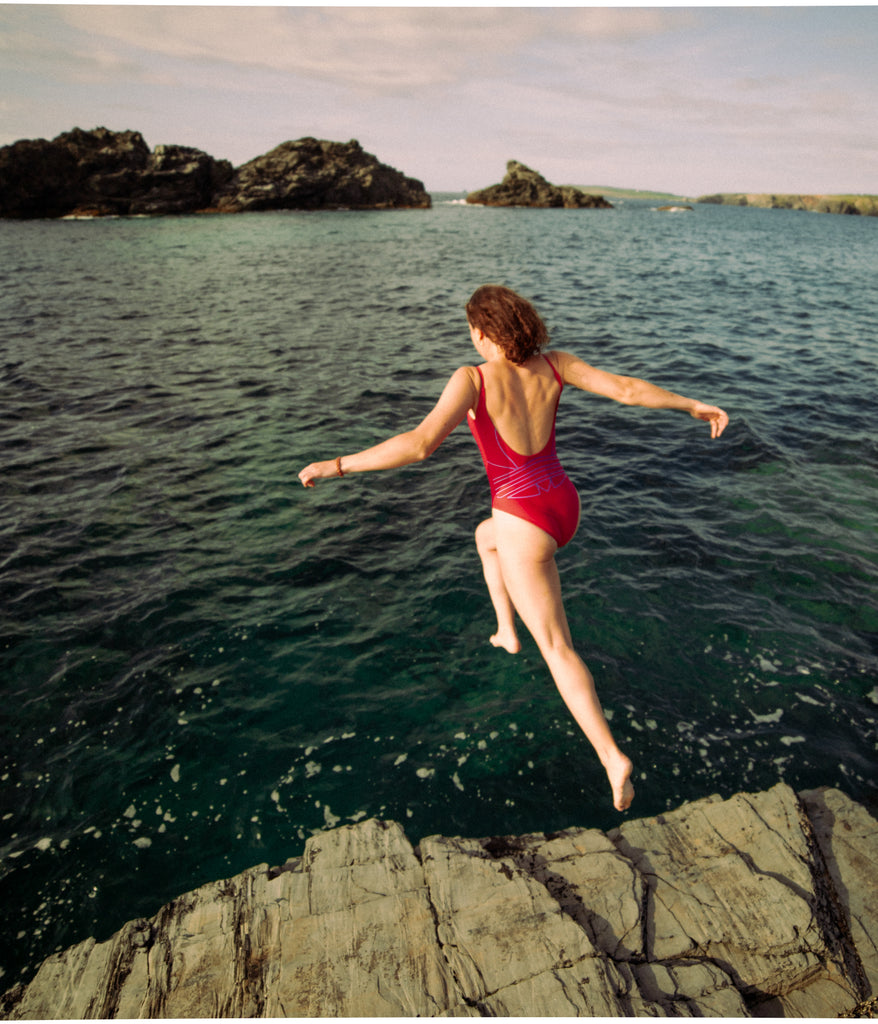
Writing and evolution of swimming. Three years on and the way in which swimming impacts Lydia’s life has evolved since her first dip, “I don’t need to use swimming as a tool for tackling anxiety in the same way as I did before,” she says. Now, Lydia writes for swimming magazines and has taken up open water swimming. Being a freelance writer, Lydia has written pieces for a range of amazing companies, dissecting everything from ocean metamorphosis and the benefits of cold water immersion, to travel articles and tales of her own journeys. You can tell she’s both a natural born storyteller and immensely passionate about what she does by the way she speaks. “I write about people, I love writing about people. I like writing about my experiences too. I recently wrote an article for Swim Magazine about Katie Maggs who is amazing. It was about the transition from open water swimming to snorkelling, and actually how it's quite common, how swimming is a gateway to the underwater world. Because once you see this stuff - especially when you’re swimming in the same place regularly - you can really start to see, understand and be more connected to the ocean environment and the lifecycles of it. I could really relate to what Katie was saying, because these same things are why I like open water swimming.” Open water swimming has also given Lydia a whole new confidence in the water, learning the proper technique and having a support system within her fellow swimmers has allowed her to not only swim multiple kilometres at a time, but also compete in her first open water swimming event here in Cornwall. “I go with a group and that enables me to swim with confidence in places I wouldn’t normally feel confident swimming on my own. So maybe stretches of water where you get boats, but because we go out with the instructor in a kayak, there’s an extra element of safety. She’s a little bit higher up so she can see things further away.” She also mentions how she finds the activity meditative: “You kind of get into a meditative state when you’re swimming in open water because it’s so centred around the breath and you’re forced into those breathing cycles because your face is in the water; actually I think that once you get into that, that also gets rid of a lot of the fear.” The way Lydia speaks about open water swimming, it’s as though she’s in a meditative trance, you can feel that the beauty of the underwater world has a big piece of her heart; that part was undeniable. “One of the reasons I love wild swimming and going for these dips is the nature element; the eco therapy and the blue therapy, all of that. But it’s so much more immersive when you’ve got your face in. You realise how much cool stuff there is in the sea; there’re seals, cuttlefish, all different types of fish, really beautiful kelp forests… It just makes you realise how much there is that you don’t know about. It's a gateway to another world, which we live side by side with.”
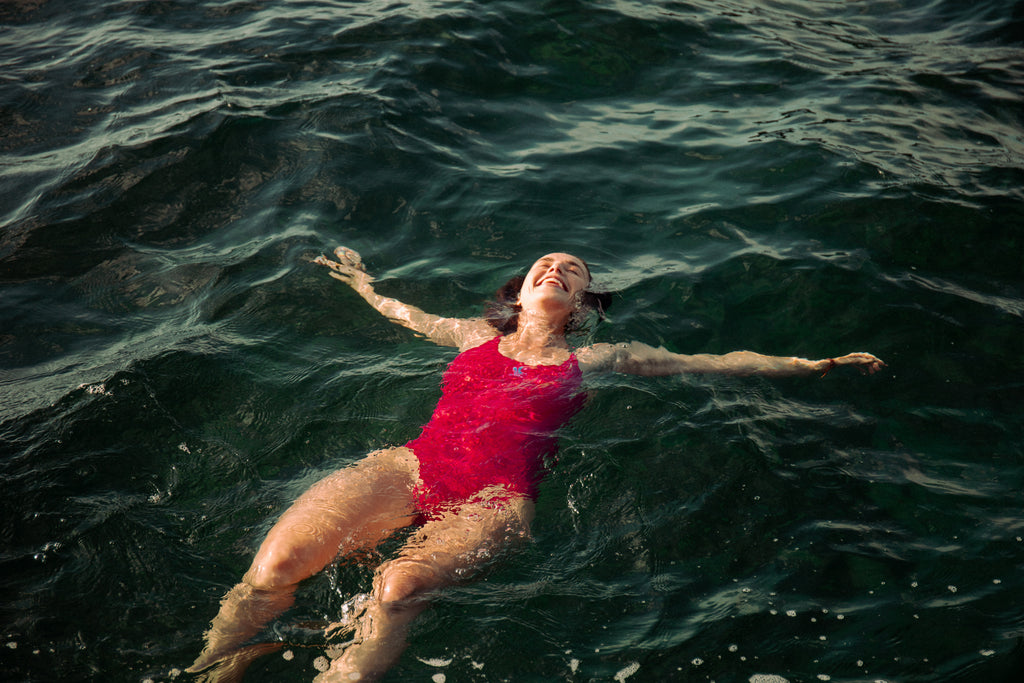
As the conversation continues, Lydia begins encouraging me to go for an open water swim of my own. She is adamant that anyone can do it, even if they don’t think they can. “I highly recommend it… Before when I was dipping, I would go and do front crawl, but my technique would be bad, my breathing would be bad, I'd do ten strokes and be gasping for air; but just with a few tips you can go much further than you think. It’s really cool and you get the biggest buzz from your first open water swim, because it’s something completely new; there’s all this adrenaline and you’re breathing in a completely different way. I would definitely recommend it, even if you just do it once.”
Accepting fear. When I ask Lydia what impact anxiety has on her life now and if she ever fears the ocean, she reveals: “I’m a naturally anxious person, but it doesn’t hold me back in the same way now.” Every day, she strives to push herself to have new experiences and has grown into a version of herself she never thought possible. However, she readily admits that despite regular open water swimming she has an “irrational fear of seals”. “I am really scared of seals. We’ll go out open water swimming and my instructor Clare will say ‘oh we’ve just had this amazing experience with a seal’. And I really want this to happen to me, I want to swim with seals and underwater dance, I'm here for it… in my mind. But then the reality is, when I'm in the water and there’s this 6ft seal, I know he’s there somewhere but I don’t know where, it terrifies me. They’re such beautiful creatures and what do we expect, we're going into their world. Rationally, you don’t have anything to worry about. But for some reason, it makes me feel really uneasy.” When we move onto the topic of fearing open water, Lydia says: “I think a lot of people fear open water, it is a primal instinct because the ocean can be dangerous. The fear is just stronger in some people than others, with some more able to think rationally about the scenario and environment they’re in… If you go with others who are more knowledgeable and also educate yourself, over time you can expel a lot of those fears.” As the conversation continues, it becomes clear that role that fear plays in Lydia’s life has matured into acceptance. She knows it’s something that will always be there, existing with her side by side, but never again will it hold her back. She is stronger than her fears and bigger than her anxieties. “I still always have an element of fear, but I don’t let it hold me back. I think that’s where the power is, knowing that something makes you a bit anxious or a bit scared, but you push yourself through that knowing there’s reward on the other side. It's the same concept with exercise: even if you’re unmotivated, you push yourself through with the discipline because you know the reward is on the other side. I think that pushing yourself in small ways everyday is where personal growth comes from. That builds up over the years and you become way stronger, or way braver or fitter. It’s the idea of slow and steady and being consistent. You can apply that to anything. It's an investment.”
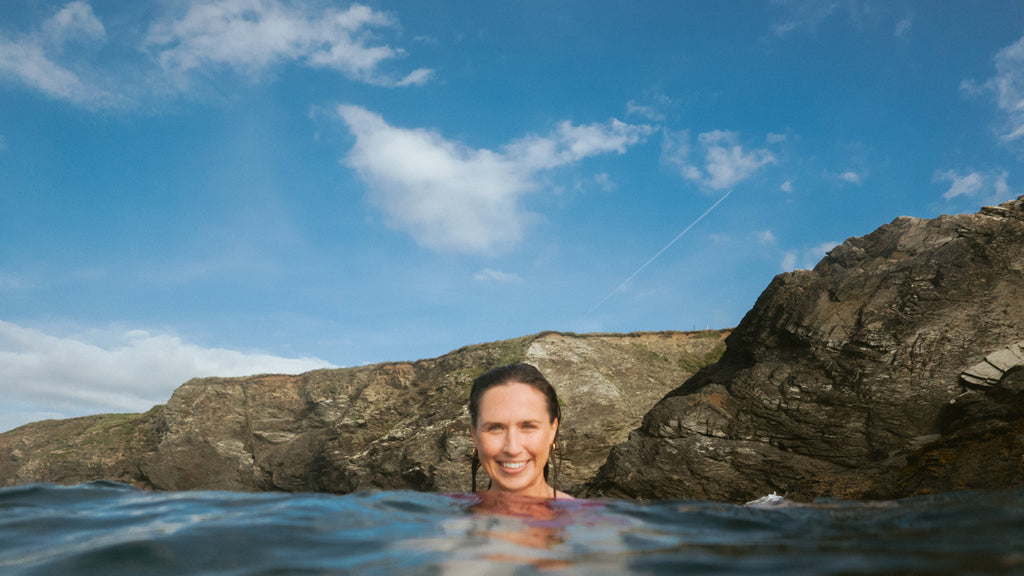
When asked what advice she would give to anyone else struggling with anxiety, fear of the ocean or those wanting to try swimming but unsure where to start, Lydia didn’t even have to think before answering, “In terms of confidence of actually getting into the water, start with research and safety, so things like rip currents, tides, ask a local, pop into a surf school or talk to the lifeguards. We also include loads of beginner tips and site-specific safety information in our guidebook. We’ve got a page on Wild Swimming Cornwall which is called ‘find your group’ where all the local groups are. Go on there, message a group, people are really nice and welcoming. You’re much less likely to back out if you’ve arranged to meet someone and the groups have loads of knowledge. If you’re feeling anxious, remember that one of the best things you can do is to combine spending time in nature and the ocean with community elements and meeting other people. The hardest part is getting out of the door, just like going for a run or exercising. So if you’ve got someone to meet and that gives you the extra push to get out the door, you’re more likely to do it. And I just think you never regret a swim. You never regret a walk or a surf or whatever it is. And it’s not about coming to the ocean to be good at something or to be competitive. So go for it and try to enjoy being there.”
New horizons. More recently, swimming isn’t the only way that Lydia has been using the ocean to overcome her fears. “There’s a lot of other things I’ve done since those dark days of anxiety that have made me feel braver… I sailed as crew across the Atlantic a couple of years ago. Going from not being able to leave the house to sailing across the Atlantic, it was crazy. The sea and swimming were able to facilitate that.” To go from nearly half a year of being unable to leave the house, paralysed by fear and swallowed whole by anxiety, to successfully sailing across the world’s second largest ocean, is incredible. In 2021, Lydia quit her job and joined a sailing boat she found online with a group of women. This boat would become her floating home for the next six months, travelling a grand total of 7,000 miles across the Atlantic and through the Panama Canal. You could see Lydia’s face brighten and her body language get lighter as she recounted her Atlantic Crossing “We were at sea for 21 days, no internet, no nothing, with five of us on the boat. We were lucky with conditions, so it was easy… The trade winds just blew us there. We sat on the boat and took it in turns doing watches. Everything was stripped back: cooking, eating, sleeping, reading and real conversations were all there was to do. That’s the most fulfilled I’ve ever been in my life. I can remember being on this boat thinking ‘there’s nowhere else I’d rather be’. It was like a reset.” That being said, Lydia isn’t ready to give up life on land full time yet: “As much as I love the sea and looking at the sea, you are quite happy to see land at the end of it. All you see is blue, everything is just blue for weeks. You try not to think about the magnitude of what you’re doing too much, but sometimes I’d imagine I was a bird looking down on the boat. It was hard to connect with the vastness of our surroundings. It was pretty insane.” Lydia is now a boat owner! Of which she is currently fixing up ready for many more big blue expeditions. You can read all about her adventures over on her blog or keep up to date with her adventures over on her on Instagram.
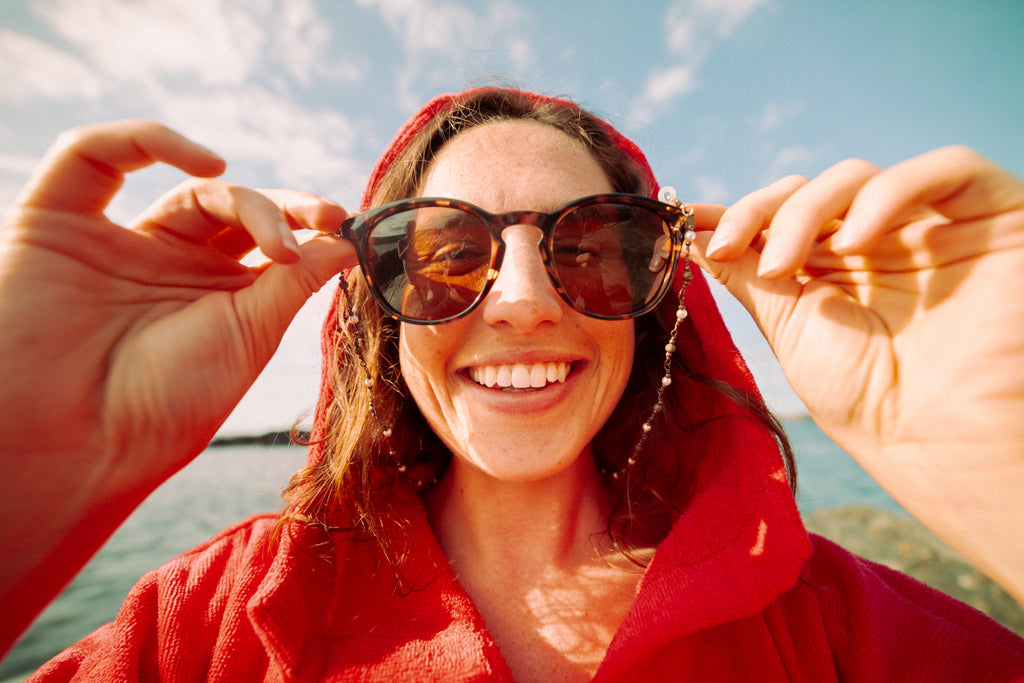
Lydia, thank you. You came into this interview from a place of strength and vulnerability, it was amazing to sit and listen to you. We are so captivated by your story and your wisdom, the whole team can’t wait to see what you do next.







